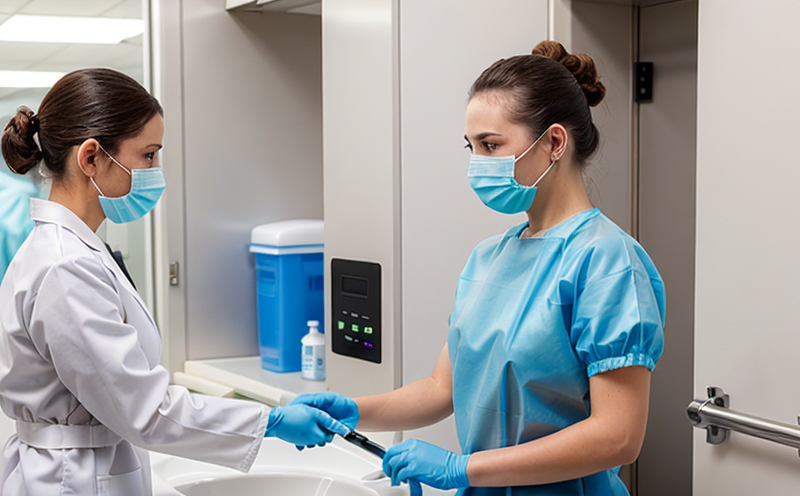BS EN 14683 Medical mask bacterial filtration efficiency
The BS EN 14683 standard is a critical document that sets out essential performance requirements for surgical masks used in healthcare settings. This standard focuses on the physical and microbiological properties of medical masks to ensure they provide adequate protection against airborne microorganisms, including bacteria. The bacterial filtration efficiency (BFE) test specifically evaluates how well a mask can filter bacteria from air, which is crucial during infectious disease outbreaks.
The BFE test measures the ability of a mask to retain bacteria within its structure when exposed to an aerosol containing known quantities of microorganisms. This measurement helps confirm that masks meet stringent hygiene standards necessary for healthcare professionals and patients alike. In this service page, we will explore why this testing is essential, the specific procedures involved, relevant applied standards, international acceptance, and frequently asked questions.
The importance of BFE testing cannot be overstated in today's global health challenges. Masks with high bacterial filtration efficiency can significantly reduce the risk of airborne infections, protecting both healthcare workers and their patients from harmful bacteria present in the environment. Compliance with this standard ensures that masks are safe for use in critical environments where hygiene is paramount.
Before diving into the specifics of how we perform BFE testing, it’s important to understand why this type of testing matters so much. The demand for personal protective equipment (PPE) has increased dramatically due to pandemic situations like COVID-19. Ensuring that medical masks meet stringent hygiene standards is crucial not only during these times but also in routine healthcare operations.
In the following sections, we will discuss why BFE testing is vital, review the relevant applied standards, explore international recognition of this standard, and answer some frequently asked questions about our services. Our aim is to provide you with comprehensive information so that you can make informed decisions regarding your quality management processes.
Why It Matters
The BS EN 14683 standard, particularly the bacterial filtration efficiency (BFE) test, plays a crucial role in ensuring the safety and effectiveness of medical masks. BFE testing is essential because it evaluates the mask's ability to filter out bacteria, which can prevent the spread of airborne diseases.
Bacterial filtration efficiency tests are conducted using an aerosol containing known quantities of microorganisms. During this test, a sample of the mask is exposed to these microorganisms. After exposure, the remaining particles are measured to determine how much of the bacteria was retained by the mask. Masks that pass this test demonstrate their capability to protect against airborne pathogens.
The importance of BFE testing extends beyond just meeting regulatory requirements; it also contributes significantly to public health and safety during outbreaks or pandemics. For instance, during the COVID-19 pandemic, there was an unprecedented increase in demand for medical masks as a means of preventing the spread of the virus. Ensuring that these masks meet high standards like BFE helps protect healthcare workers and patients from potentially life-threatening infections.
Moreover, compliance with BS EN 14683 can enhance brand reputation by demonstrating commitment to quality and safety. This is particularly valuable for manufacturers who want to ensure their products are trusted by consumers. By adhering to these rigorous testing protocols, companies can build confidence in their brand while also contributing positively to public health.
In summary, BFE testing is vital because it ensures that medical masks provide the protection needed against airborne bacteria. This testing contributes not only to regulatory compliance but also to maintaining high standards of hygiene and safety, especially during times when such measures are crucial.
Applied Standards
| Standard Name | Description |
|---|---|
| BS EN 14683:2019 | This European standard specifies the requirements, test methods, and performance criteria for surgical masks. It covers aspects such as particle filtration efficiency (PFE), bacterial filtration efficiency (BFE), and resistance to fluid. |
| ISO 22605:2019 | This international standard provides guidance on the selection, design, and performance of respirators used in healthcare settings. It includes recommendations for testing methods including BFE. |
| Test Parameters | Description |
|---|---|
| Aerosol Type | Saline aerosols containing Staphylococcus aureus or Escherichia coli bacteria. |
| Inhalation Flow Rate | 12.5 liters per minute (L/min) ± 0.3 L/min. |
| Measurement Time | At least five minutes after the aerosol is introduced into the sample chamber. |
International Acceptance and Recognition
The BS EN 14683 standard has gained widespread acceptance across Europe and beyond. Many countries have adopted this standard as a benchmark for medical mask quality, recognizing its role in ensuring the safety and effectiveness of these products. Compliance with this standard is often required by regulatory authorities when approving masks for use in healthcare settings.
Internationally recognized bodies such as the World Health Organization (WHO) recommend adherence to standards like BS EN 14683 to ensure consistent quality across different regions. By meeting these standards, manufacturers can gain broader market access and build trust with regulatory agencies and consumers worldwide.
The recognition of this standard extends beyond Europe; it is also accepted in countries that have adapted similar regulations based on WHO guidelines. This international acceptance underscores the importance of rigorous testing procedures like BFE to ensure masks meet global standards for hygiene and safety.





